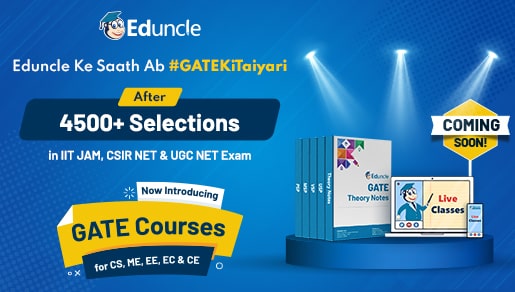Time management is very much important in IIT JAM. The eduncle test series for IIT JAM Mathematical Statistics helped me a lot in this portion. I am very thankful to the test series I bought from eduncle.
Nilanjan Bhowmick AIR 3, CSIR NET (Earth Science)Posts by Pawan Potter

Pawan
Ask, Learn & Lead It- 0 Likes
- 1 Comments
- 0 Shares
-
![comment-profile-img]() IATLIS : Prof. S.P. Narang Research Promotion Award (For Researcher)IASLIC has instituted a national level S M Ganguly-IASLIC Award for the Librarian of the Year since 1993, sponsored by Late S M Ganguly.best retired librarian award-ILAYoung Information Scientist Award -Society of Information Science (SIS)T
IATLIS : Prof. S.P. Narang Research Promotion Award (For Researcher)IASLIC has instituted a national level S M Ganguly-IASLIC Award for the Librarian of the Year since 1993, sponsored by Late S M Ganguly.best retired librarian award-ILAYoung Information Scientist Award -Society of Information Science (SIS)T
T
- 0 Likes
- 1 Comments
- 0 Shares
-
![comment-profile-img]() An intervening variable is a hypothetical variable used to explain causal links between other variables. Intervening variables cannot be observed in an experiment (that's why they are hypothetical). For example, there is an association between being poor and having a shorter life span.Extraneous variables are any variables that you are not intentionally studying in your experiment or test. When you run an experiment, you're looking to see if one variable (the independent variable) has an effect on another variable (the dependent variable). ... These undesirable variables are called extraneous variables.An independent variable is defines as the variable that is changed or controlled in a scientific experiment. It represents the cause or reason for an outcome.Independent variables are the variables that the experimenter changes to test their dependent variable. A change in the independent variable directly causes a change in the dependent variable. The effect on the dependent variable is measured and recorded.A dependent variable is what you measure in the experiment and what is affected during the experiment. The dependent variable responds to the independent variable. It is called dependent because it "depends" on the independent variable. In a scientific experiment, you cannot have a dependent variable without an independent variable.T
An intervening variable is a hypothetical variable used to explain causal links between other variables. Intervening variables cannot be observed in an experiment (that's why they are hypothetical). For example, there is an association between being poor and having a shorter life span.Extraneous variables are any variables that you are not intentionally studying in your experiment or test. When you run an experiment, you're looking to see if one variable (the independent variable) has an effect on another variable (the dependent variable). ... These undesirable variables are called extraneous variables.An independent variable is defines as the variable that is changed or controlled in a scientific experiment. It represents the cause or reason for an outcome.Independent variables are the variables that the experimenter changes to test their dependent variable. A change in the independent variable directly causes a change in the dependent variable. The effect on the dependent variable is measured and recorded.A dependent variable is what you measure in the experiment and what is affected during the experiment. The dependent variable responds to the independent variable. It is called dependent because it "depends" on the independent variable. In a scientific experiment, you cannot have a dependent variable without an independent variable.T
T
- 0 Likes
- 1 Comments
- 0 Shares
-
![comment-profile-img]() ABSTRACTS are found in several styles. Commonly encountered ones are :1. INDICATIVE or DESCRIPTIVE: gives content and makes general statements about the original scholarly work.2. INFORMATIVE: provides qualitative and quantitative findings of scientific report. Often includes statement of problem, objectives, method, results, and conclusions.3. Some ABSTRACTS combine the above two types with major points addressed INFORMATIVELY and minor points handled INDICATIVELY.4. CRITICAL ABSTRACT: evaluates as well as describes the original work.As well as critically reading ABSTRACTS, the library researcher often takes notes on information. Note taking which follows the style of an INFORMATIVE ABSTRACT is concise and useful when referred to at a later date.T
ABSTRACTS are found in several styles. Commonly encountered ones are :1. INDICATIVE or DESCRIPTIVE: gives content and makes general statements about the original scholarly work.2. INFORMATIVE: provides qualitative and quantitative findings of scientific report. Often includes statement of problem, objectives, method, results, and conclusions.3. Some ABSTRACTS combine the above two types with major points addressed INFORMATIVELY and minor points handled INDICATIVELY.4. CRITICAL ABSTRACT: evaluates as well as describes the original work.As well as critically reading ABSTRACTS, the library researcher often takes notes on information. Note taking which follows the style of an INFORMATIVE ABSTRACT is concise and useful when referred to at a later date.T
T
- 0 Likes
- 1 Comments
- 0 Shares
-
![comment-profile-img]() "Information hunger" refers simply to being highly motivated to learn. A love of learning or even an addiction to learning new information.Information Appetite is a term implying a strong desire to acquire or participate in.Information pollution (also referred to as "info pollution") is the contamination of information supply with irrelevant, redundant, unsolicited , hampering and low-value information. The spread of useless and undesirable information can have a detrimental effect on human activities.T
"Information hunger" refers simply to being highly motivated to learn. A love of learning or even an addiction to learning new information.Information Appetite is a term implying a strong desire to acquire or participate in.Information pollution (also referred to as "info pollution") is the contamination of information supply with irrelevant, redundant, unsolicited , hampering and low-value information. The spread of useless and undesirable information can have a detrimental effect on human activities.T
T



























“In my beginning is my end”, “East Coker”